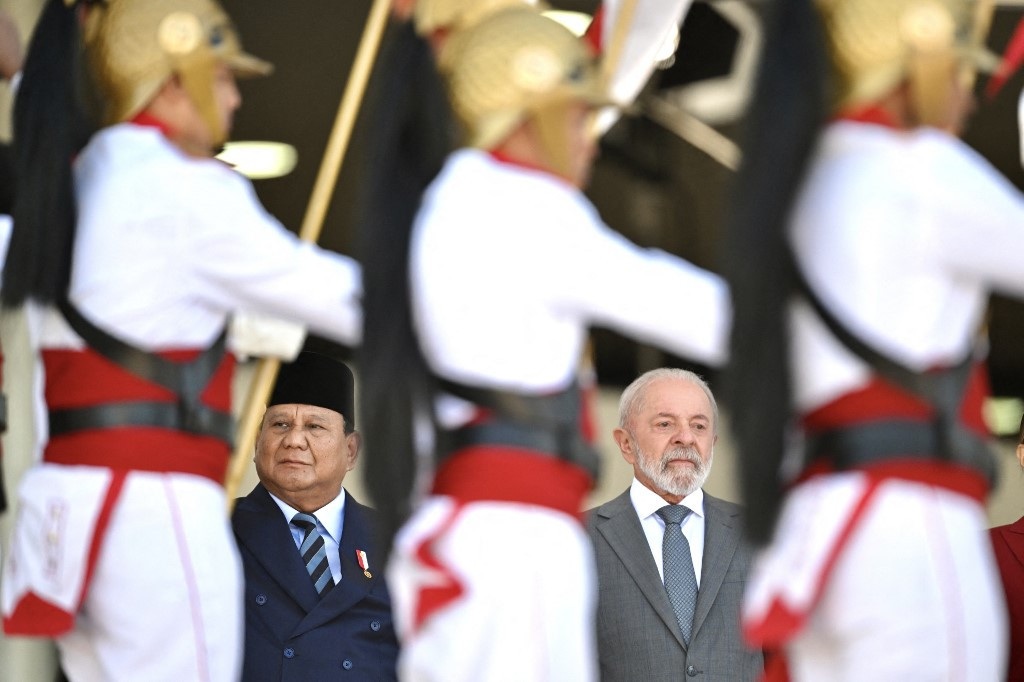Popular Reads
Top Results
Can't find what you're looking for?
View all search resultsPopular Reads
Top Results
Can't find what you're looking for?
View all search resultsPrabowo’s diplomatic temptation
Prabowo should adhere to Indonesia's constitutional mandate of a "free and active" foreign policy and exercise caution and wisdom.
Change text size
Gift Premium Articles
to Anyone
P
resident Prabowo Subianto's ambition to elevate Indonesia's global influence, partly through extensive international travel, mirrors the approach of the second president Abdurrahman "Gus Dur" Wahid. However, Prabowo should consider that Gus Dur's significant diplomatic achievements abroad ultimately had limited impact domestically.
Prabowo recently attended the BRICS annual summit in Brazil as a full member of the organization. Other new members include Belarus, Bolivia, Kazakhstan, Cuba, Nigeria, Malaysia, Thailand, Vietnam, Uganda and Uzbekistan. Notably, all old and new members except Kazakhstan and Uzbekistan are also part of the Global South.
At the summit, leaders were keen to express their dissatisfaction with United States President Donald Trump, yet they sought to avoid outright confrontation. Despite this, Trump vowed to punish what he deemed "hostile acts" from these nations.
The BRICS declaration largely aligns with statements from the Global South, such as those advocating for United Nations Security Council reform. However, it remains to be seen if permanent UNSC members Russia and China share the same aspirations as other BRICS nations on this front.
During his 21-month presidency from October 1999 to July 2001, Gus Dur visited over 30 countries, including all major powers. He garnered strong support from international leaders to revive Indonesia's economy and democracy and to establish the nation as a key player in global diplomacy. Despite these successes, foreign leaders were inevitably affected by his impeachment in July 2001, limiting the long-term impact of his diplomatic efforts.
While there's no intention to directly link Gus Dur's downfall with Prabowo's situation – especially given that the current President's ruling coalition controls over 80 percent of the House of Representatives, this serves as a gentle reminder. Prabowo should adhere to Indonesia's constitutional mandate of a "free and active" foreign policy and exercise caution and wisdom, particularly in navigating the temptation to take sides amid Trump's trade disputes with numerous countries.
Since taking office in October last year, Prabowo has visited several major countries, consistently receiving warm receptions. He has met with prominent world leaders including Chinese President Xi Jinping, Indian Prime Minister Narendra Modi and French President Emmanuel Macron. Despite these high-profile engagements, the precise direction of his foreign policy remains unclear to many.
At the BRICS summit in Rio de Janeiro, leaders issued a carefully worded critique of US President Trump, who had threatened a 10 percent tariff on BRICS members. For Indonesia, this could mean facing a total import tariff of 52 percent from the US.
Indonesia's extensive diplomatic efforts to influence Trump have largely proven unsuccessful. Although the US’s military, economic and political influence may be declining, most countries still hesitate to openly retaliate against Trump's unilateral actions.
Notably, for the first time, President Xi was absent from the BRICS summit, with Premier Li Qiang attending in his stead. President Xi is well aware that Trump cannot compel China to follow his wishes, yet he chose to avoid unnecessary clashes despite the US's diminishing power and influence.
Prabowo has a full five-year mandate to lead Indonesia until October 2029 and is constitutionally empowered to conduct a free and active foreign policy. However, amid the current global economic and power imbalances, there's a strong temptation for the President to compromise this policy for short-term gains.
Gus Dur's presidency offers a valuable lesson: While foreign policy successes are highly regarded by the public, ultimately, it is domestic affairs that determine the fate of a nation's leaders.
In fact, Indonesia's membership in BRICS offers significant opportunities to advance its national interests amid the great power rivalry between the US and China. The key is to leverage this position strategically.
To truly benefit, however, Indonesia must have a clear domestic agenda and priorities that it brings to the BRICS forum, rather than merely adapting to the group's agendas. This includes ensuring investments and projects align with national priorities and environmental sustainability.











